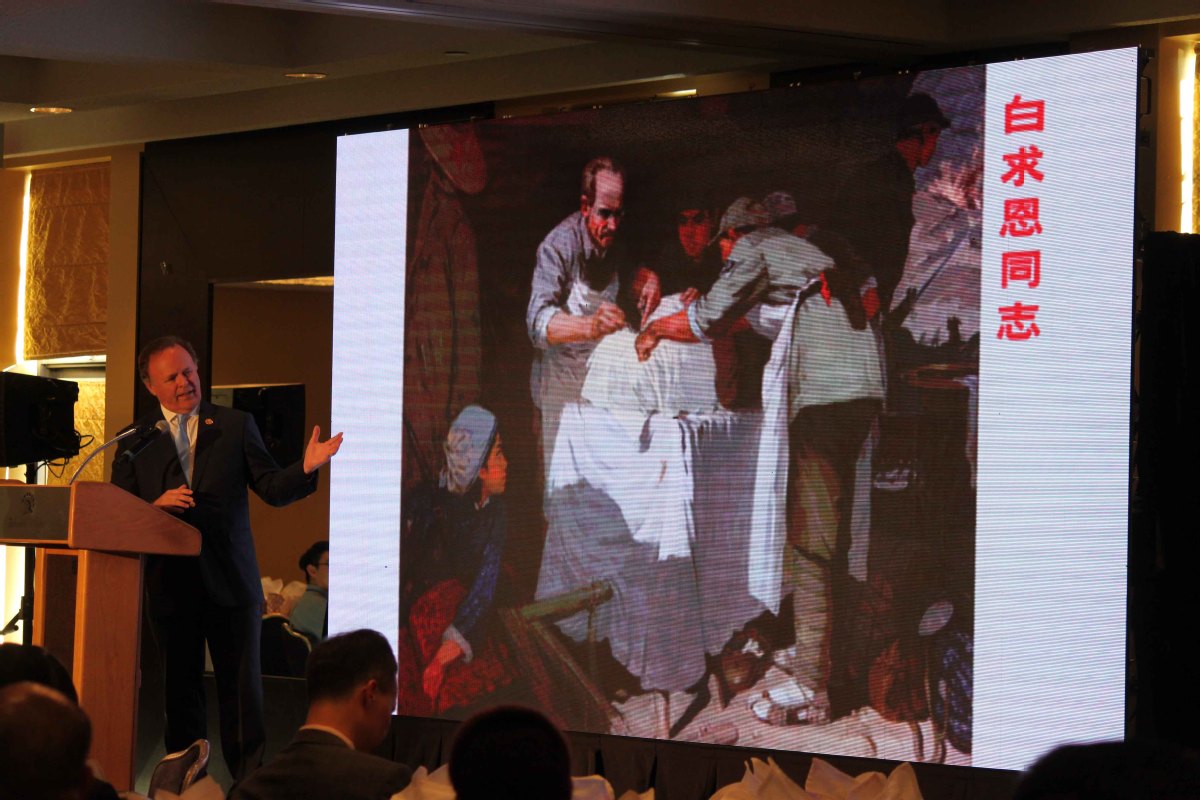Celebrating Dr Norman Bethune amid tense times
By NA LI in Toronto | China Daily Global | Updated: 2019-06-13 23:01

The legacy of Dr Norman Bethune is being invoked at a time of tensions between Canada and China.
On the 80th anniversary of his passing marked at a Canada and China Medical-Healthcare Innovation forum last weekend in Markham, Chinese and Canadian medical professionals hailed Bethune as an internationalist man who helped strengthen ties between the two countries over several decades with his selfless medical work in China.
"We want to (continue) to promote exchanges. The Canada-China relationship started with Norman Bethune. Although the current relationship is not desirable, the Bethune legacy goes to smoothen relations, and I believe it will get better," said Wang Peizhong, organizer of the forum, who is a professor of epidemiology at the Memorial University of Newfoundland.
According to Wang, Bethune's legacy and spirit have new and broad meaning in a modern and ever-changing society.
"They mean peace, social justice and tolerance, improving health care through education and research. These are what we are promoting," Wang said.
Dr Cheri Bethune, a Canadian family physician with an ancestral relationship to Bethune, as he was a cousin of her grandfather, told the forum she had many opportunities to learn about Bethune's legacy.
"Canadians don't understand really how much adulation and the friendship Chinese people have for Canada because of Norman Bethune, and they don't recognize that Norman Bethune did those things. They are all still discovering what he did mean (to us)," says Cheri Bethune.
In the late 1930s, Bethune served as a battlefield surgeon for China during the War of Resistance Against Japanese Aggression (1931-1945). He also established training for doctors and nurses. In 1939, Bethune cut his finger while operating on a soldier and died of blood poisoning.
According to Cheri Bethune, the more she discovers about her relative, the more she understands what he did and what he represented, in addition to appreciating that those are all Canadian values, and more Canadians need to be aware of his legacy.
She said Canada needs to understand that China wants a good relationship based on the values, dedication and selflessness that Norman Bethune had demonstrated, and that there is a lot of room for healing current issues.
"I think rearticulating the values that Norman Bethune represented and how important these are to China, and how Mao had used Bethune as an example of selfless dedication will help," Cheri Bethune said.
Dr James Swan, president of the Ontario Association of Cardiologists, who visited China last October and in May, as a member of the Bethune Medical Development Association of Canada, said medical cooperation between the two countries had its roots in Bethune's work.
"Our goal was to really take the expertise here we have in Canada, and share it with Chinese doctors and learn what they are doing, and work together to make it better for patients," Swan said.
"One of the things I was showing them was how to use new technology to help patients with end-stage heart failure. It is a wonderful exchange, we learn from them and they learn from us. We don't speak the same languages, but we look at the patients and images, and we can (still) come up with solutions that are good for patients," he said.
You Hong, president of the Beijing Alumni Association of the Bethune University of Medical Sciences, shared how Chinese medical professionals are carrying on the legacy of Bethune in responding to medical and health crises back in China.
She cited the outbreak of SARS (severe acute respiratory syndrome) 16 years ago in China, and tells of how more than 1,000 Chinese military doctors, including Bethune University students, risked their lives to save others at Xiaotangshan Provisional Hospital.
You and a medical team went to the disaster area during the Wenchuan earthquake 11 years ago and the Yushu earthquake eight years ago.
Five years ago, with the Ebola virus outbreak in Africa, 1,400 Chinese doctors, cardiac surgeons and medical leaders traveled to Africa to assist.
"We are proud to see that our doctors and Bethune University students have become the carrier of Bethune spirit in China and around the world. Today we gather here because of Dr Bethune and Bethunism. His humanitarian and passion encourage us to do the same," You said.
"We believe Bethunism will continue to have a significant impact on the healthcare in China and would like to work together with institutions and individuals in Canada to promote Bethunism and contribute to the improvement of healthcare in both countries," she added.
Bethune was transformed from an ordinary doctor to a great international fighter and gave his life to China. Chairman Mao Zedong wrote an article In Memory of Norman Bethune in 1939, which made him (and Bethunism) more known in China.
























